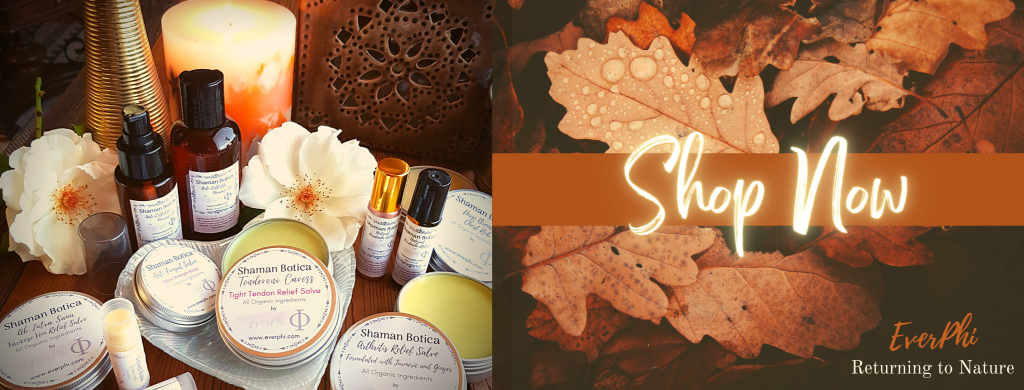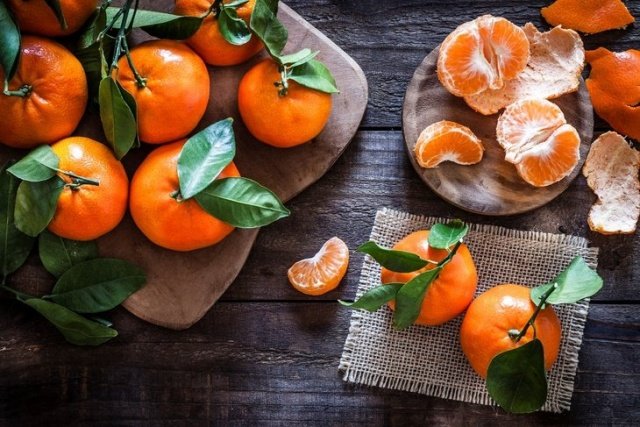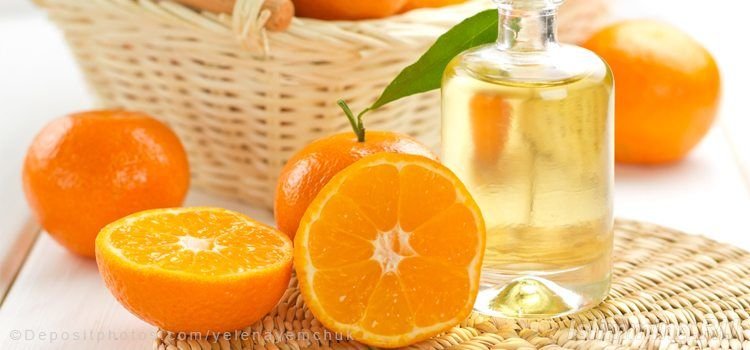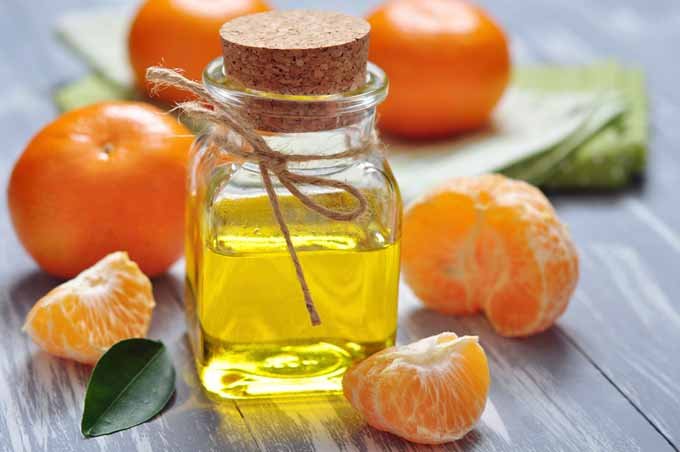
Mandarin Essential Oil , also known as red mandarin, tangor and temple orange is a volatile extract with a thin consistency and orange to dark yellow in color. It has a medium-strength sweet, citrusy, fruity, and slightly floral aroma presenting a top fragrance note.
Mandarin oil is a widely used essence since its freshness and power of relaxation is very high, in comparison with other oils of the same category (citrus).
Expression or cold pressing method is frequently applied in extracting the oil, and the oil is commonly known as cold-pressed oil.
It can also be extracted from the peel by other means, such as distillation by steam or water, as well as extraction with supercritical or liquid CO2. However, cold pressed oils have finer aromas and greater stability than distilled oils due to the absence of heat during process and the inclusion of components, such as antioxidants.
Mandarin essential oil is a very versatile oil that mixes well with almost all others. However, it blends especially well with Peru balsam, grapefruit, bergamot, neroli, lime, orange, lemon, jasmine, lavender, rose, sandalwood, frankincense, myrrh, clove, nutmeg, anise, cassia, vanilla, geranium and rosewood essential oils.
Citrus fruits have been cultivated for over 4000 years and are the most produced fruit crop in the world. Citrus fruits belong to the family Rutaceae, in which the leaves usually possess transparent oil glands and the flowers contain an annular disk.
They are largely processed for their juice, one of the most important commodities, as well for their essential oil.
Citrus essential oils are mainly utilized as flavorings by a variety of food industries, especially for beverages, ice cream, confectionery and snacks production.
Mandarin is the most 15 cultivated citrus cultivar in Indonesia due to its high yield, ease of cultivation and it is also well-liked by the locals.
It has thin, fairly shiny and yellowish green colored skin. The diameter of the fruit ranges from 5.5 to 5.9 cm. The flesh is orange in color, contains large amount of juice and has a very sweet taste.
Despite the fact that the United States of America and Brazil are the main producers of citrus fruits, the place of origin of citrus fruits is believed to be south eastern Asia.
Later, these were subsequently brought to the Middle East and Southern Europe, and further distributed to many other countries by the assistance of travelers and missionaries following the paths of civilization.
There are many varieties of citrus fruits in the region of Asia that have distinct flavor characteristics and are only consumed locally. Some of them have great potential to be further studied and their distinct aroma profiles elucidated in order to reveal specific compounds that contribute to their uniqueness, as is the case of Mandarin (Pontianak orange – Citrus nobilis Loureiro var. microcarpa Hassk).

Pontianak orange (Citrus nobilis Loureiro var. microcarpa Hassk) belongs to the mandarin group. According to Morton (1987), Citrus nobilis is suggested to be the possible hybrid between sweet orange (Citrus sinensis) and mandarin (Citrus reticulata).
The history of Pontianak oranges in Indonesia is believed to originate in 1936, when they were firstly grown in surrounding towns nearby Pontianak of West Kalimantan province in Indonesia by local farmers. However, there was a major damage of this cultivar in Indonesia due to government policy and disease infection over the last decade.
Recently, the local government begins to encourage the cultivation of Pontianak orange across the country.
Historically, citrus peels were used in some traditional medicines in countries such as China, Korea and Japan. These were applied mainly to cure skin inflammation, indigestion, cough, muscle pain, ringworm infections and reduce blood pressure, among others.
The main chemical compounds of mandarin essential oil are: D-limonene, Y-terpinene, Linalool, Alpha-pinene, B-Myrcene (7-methyl-3-methyleneocta-1,6-diene), Terpinolene, Sabinene, Octantal, Nonanal and Citronellal, among others.
Mandarin essential oil supports healthy digestion; cardiovascular, nervous and lymphatic system function; immunity and circulation; while dispels heavy energies and prompts us to always enjoy the life.
Among the most known therapeutic properties of mandarin oil are the following: antiinflammatory, antibactrial, antifungal, antiseptic, antispasmodic, carminative, antidepressant, calming, nervine, sedative, stomachic, hepatoprotective, digestive, phlebotonic, desinfectant, deodorant, anti-proliferative, chemoprotective and antioxidant.
Although mandarin essential oil is recognized for its use as a powerful relaxant, it also has other uses that have been added over time thanks to many studies and research on its therapeutic properties.
Mandarin oil is also used to make perfumes, soaps, cosmetics, and as a flavoring agent in liqueurs and confectionery. In addition, it is widely used to make homemade cleaning products and sprays, since it helps to disinfect environments thanks to its bactericidal and antifungal effect.
On the other hand, the pleasant aroma promotes good mood and calms the mind after stressful situations.
Therapeutically, mandarin essential oil is also useful for:
Various diseases such as aging, arthritis, cancer, inflammation, and heart disease, cause oxidative stress. Mandarin essential oil and other citrus fruit extracts were found to have potential antioxidant bioactivity.
Citrus fruits are reported to have a good antioxidant ability especially because of their phenolic compounds with poly-hydroxyl groups, including phenolic acids, flavonoids and their derivatives.

Inflammatory cytokines are active in the pathogenesis of various chronic inflammatory diseases such as multiple sclerosis, Parkinson’s disease, Alzheimer’s disease and colon cancer.
Flavonoids, coumarin and volatile oil from citrus fruit such as mandarin are showing anti-inflammatory activity, which can be used as a supplement to protect against or ameliorate this chronic inflammatory diseases.
Citrus fruits are high in secondary metabolites, including flavonoids, limonoids, and coumarins, which are associated with a reduced risk of cancer, including: gastric cancer, breast cancer, lung tumorigenesis, colonic tumorigenesis, hepatocarcinogenesis, hematopoietic malignancies, etc.
The effects of limonene, the main compound in mandarin essential oil were studied on two human tumor cell growth lines. Both mandarin essential oil and limonene, were tested showing the inhibition of tumor growth of these cell lines. Although the results are encouraging, more research is needed in this area.
Nobiletin, on the other hand, was found to have anti-inflammatory and anti-tumor invasion, proliferation, and metastasis in vitro and in animal studies. In addition, it was also found to potentially inhibit cartilage degradation, among others.
Large epidemiological studies frequently link increased consumption of flavonoid-rich foods with reduced cardiovascular morbidity and mortality through the impact on blood lipid, blood glucose and vascular function.
The beneficial effects of citrus peel against certain degenerative diseases (e.g., coronary heart disease) as an antiinflammatory and anticarcinogenic agent have been observed.
Research showed that mandarin peel ethanolic extract, one of the chemical compound of mandarin essential oil, had potency to be developed as cardioprotector agent in chemotherapy.
A number of experiments suggested that Citrus-derived flavonoids may lower blood cholesterol and triglyceride.
In high-fat fed Ldlr mice, the addition of nobiletin (a flavonoid isolated from citrus peels) resulted in a dramatic reduction in both hepatic and intestinal triglyceride accumulation, attenuation of very low-density lipoprotein triglyceride secretion and normalization of insulin sensitivity.
However, more research is still needed in this regard.

Experiments in rats showed suppression on D-galactosamine-induced liver injury attenuation of the markers of hepatic damage and hepatic inflammation suppression on oxidative stress and expression of TLR-4 but not TLR-2.
Other research demonstrated that Citrus flavonoids present in mandarin oil, play important roles in preventing the progression of hyperglycemia, partly by binding to starch, increasing hepatic glycolysis and the glycogen concentration, and lowering hepatic gluconeogenesis.
Hesperidin, naringin and nobiletin, also exhibited antidiabetic activities, partly by lowering hepatic gluconeogenesis or improving insulin sensitivity in diabetic animals.
A study suggested that, naringenin conferred protection against experimental diabetes through its antihyperglycemic and anti-oxidant properties in streptozotocin-nicotinamide-induced experimental diabetic rats.
In vivo, chronic treatment of diabetic rats with naringenin, could prevent the functional changes in vascular reactivity in diabetic rats, through a NO-dependent and prostaglandin-independent pathway.
The essential oil of mandarin showed inhibition of spilling and pathogenic microorganisms such as Enterococcus faecim, Staphilococcus aureus, Pseudomonas aeruginosa, Escherichia coli, Salmonella Typhimurium and Salmonella enterica subs. Enteric ser. Enteritidis.
Mandarin essential oil acts as a relaxing agent for agitated nerves and reduces stress and emotional imbalance. In addition, it works as a sedative to relieve anxiety, depression, nervousness, and promotes a healthy sleep.
Besides, it acts as a relaxant to relieve spasms of all kinds, such as nervous, muscular, stomach spasms, etc.
Mandarin essential oil is generally safe when used properly. However, for patients who are under medical treatment for cardiovascular disease, liver disease, diabetes or hypertension, we recommend that you seek guidance from a qualified professional before using mandarin essential oil, especially if you have any existing medical condition, or if you are pregnant or breastfeeding.
Also, consider the following:
Generally, good quality oils, that is, 100% pure, therapeutic grade and not mixed with other substances, can be found in specialized natural herb stores.
If you can not reach a trusted naturist or herbalist shop near you, here are some online products recommendations:
Scent Characteristics: Very sweet, light, citrusy, fruity scent.
Our 100% Pure Essential Oils are extracted from the root, bark, wood, seed, fruit, leaf, or flower of a freshly harvested plant.
We source only the finest quality essential oils from highly regarded suppliers and distillers from around the world, many with whom we’ve worked with for decades.
Many of our oils are steam-distilled or cold-pressed, therefore retaining the essential odor, aroma, taste, medicinal, and therapeutic properties of the plant, resulting in a superior quality, and highly concentrated essence. Shop here.